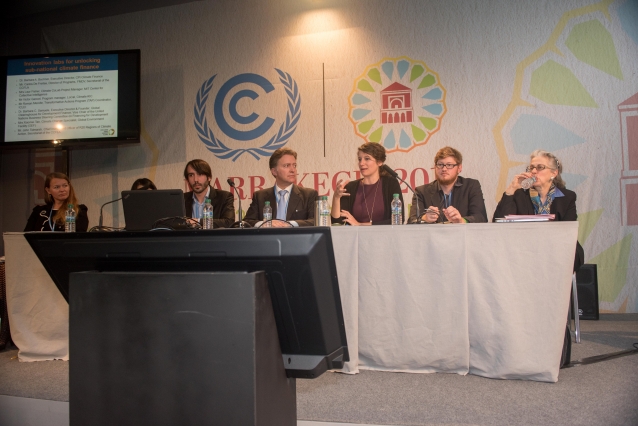
An MIT research initiative is harnessing the power of crowds and online collaborative tools in support of fulfilling global Paris Agreement climate goals.
MIT’s Climate CoLab, founded and directed by Professor Thomas Malone of the MIT Center for Collective Intelligence, presented its work and innovative approach in a series of events earlier this month at the United Nations Framework Convention on Climate Change (UNFCCC) Conference of the Parties in Marrakech, Morocco (COP22). Climate CoLab’s team was on the ground in Marrakech to strengthen and build new collaborations with the international community in support of the 2015 Paris international climate agreement, and to showcase the role crowds and online collaborative tools can play in supporting implementation of the Paris Agreement goals. Of the project, Malone said: “It’s now possible to harness the collective intelligence of thousands of people, all over the world, at a scale, and with a degree of collaboration, that was never possible before in human history.”
Amid notable milestones in international climate cooperation this fall — including the early legal entry into force of the Paris Agreement, a recent international accord on reducing global hydrofluorocarbons (HFCs), and another on reducing emissions from the aviation sector, COP22 was still awash with reminders of the stark scientific realities that further near-term action is needed to combat the most dangerous impacts of climate change. Among them, a new United Nations’ Environmental Program 2016 Emissions Gap Report, released immediately prior to COP22, projected that 25 percent greater global emissions cuts are needed prior to 2030. UN Secretary-General Ban Ki-moon recently urged the global community, “We are still in a race against time. We need to transition to a low-emissions and climate-resilient future.”
Climate CoLab is pioneering a crowd-based methodology to help meet this challenge. The project was highlighted during several events at COP22, including two official UN side events, and a featured interview with the UNFCCC Climate Change Studio. “What if we could harness all of the ingenuity and intelligence of everybody that’s [at COP22], and also everybody that couldn’t be here today, to continuously work together on climate change solutions? What could be possible?” said Laur Hesse Fisher, Climate CoLab project manager, during the interview. “New digital collaboration tools enable that,” she continued.
On Monday, Nov. 14, Climate CoLab co-hosted an official side event with collaborator Climate Interactive and the Abibimman Foundation, entitled “Meeting the Paris Goals through Decision-Maker Tools and Climate Education.” Panelist Andrew Jones, Climate Interactive’s co-director, started the session with the premise that we need large-scale engagement in order to adequately address this challenge: “We don’t need 10,000 experts, we need 1 billion amateurs doing all they can, effectively, to make change.”
The role of non-state actors and open transparent stakeholder engagement processes were featured throughout COP22. On Nov. 15, Hesse Fisher joined a panel of collaborators from various international organizations, including Climate Policy Institute, Climate-KIC, the Global Environmental Facility, ICLEI, and many others, organized by the Cities Climate Finance Leadership Alliance. Addressing an audience of government officials, academics, non-profit advocates, and others, the panelists discussed the role of innovation platforms and tools in helping finance climate action.
Additionally, building on last year’s launch of a partnership with the UN Secretary-General’s Climate Resilience Initiative: Absorb, Anticipate, Reshape (A2R), Climate CoLab was featured in an A2R brochure distributed at A2R Initiative COP22 events, for its new contest on “Anticipating Climate Hazards,” which seeks proposals on early warning systems and climate preparedness responses. Of the collaboration, Malone said, “To contend with the most pressing impacts of climate change, it is clear that now more than ever before, we need ideas and contributions of as many people as possible to address climate change.”
As focus turns to accelerating countries’ implementation of their emissions reductions targets and adaptation strategies put forward under the Paris Agreement — also known as “nationally-determined contributions” or “NDCs” — Climate CoLab is exploring how this online collaborative approach of stakeholder engagement and expert-validated climate planning including assessment could prove valuable to countries. Building on themes of open engagement and enhancing transparency, Malone remarked, “We believe it’s possible to open up the national and international climate planning processes to anyone around the world who wants to participate.” As Fisher said, this approach provides “new ways that the world can work together.”